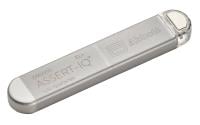Many insertable cardiac monitors, known as ICMs or loop recorders, are already able to stay in place under the skin for several years at a time, enabling long-term tracking of irregular heartbeats—but Abbott has upped the ante.
The medtech giant’s Assert-IQ implant is newly cleared by the FDA, Abbott announced Thursday, and offers two battery life options, the longer of which can last for at least six years, which Abbott has termed “the world’s longest battery life for an insertable cardiac monitor.”
The shorter-term version of the ICM is designed to last for at least three years. According to the devicemaker, that option may work better for patients who need to be monitored to diagnose arrhythmias, heart palpitations or other cardiac symptoms, while the six-year iteration is designed for extended monitoring of patients who have already been diagnosed and are already undergoing treatment or are at risk of developing additional conditions.
Abbott also notes that the Assert-IQ devices can reach their allotted time spans without limiting any of their features. In comparison, Medtronic’s longest-lasting ICM, the Reveal Linq II, can last up to 4.5 years under “nominal settings,” in which optimization with the connected smartphone app is turned off; if app optimization is on, the implant’s life span drops to 2.5 years.

Like other ICMs already on the market from Abbott, Medtronic, Boston Scientific and more, the Assert-IQ models are equipped with Bluetooth technology so they can wirelessly connect to a patient’s smartphone or a separate transmitter. The implant sends heart rhythm readings to the connected device every 20 seconds, and those results are in turn sent to a clinician portal for doctor review.
Additionally, according to Abbott, some models of its newest loop recorder can be remotely programmed by doctors, who may want to adjust a device’s arrhythmia detection parameters over time based on a patient’s specific needs.
“As the incidence of abnormal heart rhythms like atrial fibrillation continue to rise, more doctors are turning to ICM technology to monitor their patients remotely to better detect the cause of symptoms that can impact overall health and quality of life,” Leonard Ganz, M.D., chief medical officer of Abbott’s cardiac rhythm management business, said in the announcement.
“Until now, insertable cardiac monitors have allowed for remote monitoring of patients but lacked the longevity needed to monitor them long-term,” Ganz continued. “Abbott’s Assert-IQ ICM offers physicians a connected health device that will help them provide the best care for their patients while making more accurate and informed treatment decisions.”
As they gather heart rhythm data, the Assert-IQ implants use built-in algorithms to analyze those readings, automatically flagging potential cases of arrhythmia that may otherwise go unnoticed.
Study data presented last year show that the algorithms achieved over 96% sensitivity in detecting cases of afib and tachycardia. Additional clinical data (PDF) cited by Abbott suggest that the Assert-IQ algorithms can reduce false detections of afib and ventricular pauses by more than 98% compared to ICMs that don’t use algorithms to discriminate between heart rhythm readings.